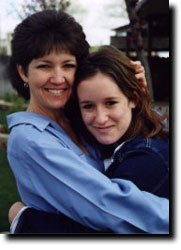 |
|
 |
|
|
Debbie Mendes #97744-012 |
 Debbie and her daughter, Heather |
My indictment alleged that Joseph Arvizu and Richard Ramos supervised the distribution of large quantities of cocaine imported into the United States from Mexico, and that I assisted Arvizu and Ramos in their drug trafficking activities by managing their funds, purchasing and leasing residences and commercial warehouses to store cocaine, and depositing drug proceeds in less than $10,000 increments to avoid Federal Currency Reporting requirements.
I am a 40 year old widowed mother of three children. I am a first time, non-violent prisoner with no prior criminal record. From 1976 until February 1991, I had a very successful career at the Bank of America, where I rose through the ranks from Teller to Assistant Vice President, Branch manager. In April 1990, I met Richard Ramos, a former practicing attorney who had several commercial accounts at the Bank of America branch where I worked. Ramos told me that he represented a group of foreign investors who were involved in real estate and other business transactions in the United States and overseas. Later in the year, Ramos introduced me to Joseph Arvizu and told me that he was a member of the investment group. In February 1991, I left the bank and took a position with one of Ramos' companies. The charges against me arise out of my employment relationship with Ramos and Arvizu.
Although the prosecution called 70 witnesses at trial, none of these witnesses provided first-hand testimony that I knowingly and willfully participated in a conspiracy to distribute cocaine. Instead, the prosecution based its case entirely on circumstantial evidence relating to my involvement in financial and real estate transactions on behalf of Arvizu and Ramos.
In July 1992, I self-surrendered to the authorities upon learning of my pending indictment. Anxious to clear my name and prove myself innocent of the charges against me, I returned from Mexico where I was living, only to face the biggest nightmare of my life and the travesties of justice in this country. Because of mandatory minimums, upon my conviction, I was facing four life sentences, despite being accused as a first time, non-violent offender. Ultimately I received four twenty-four year, four month sentences run concurrently.
Mandatory minimum sentencing serves only to punish the innocent and/or minor drug offenders. The real drug conspirators and drug lords either remain free because they have the connections and money to buy their freedom, or, if they are apprehended, they have information to trade for a substantial reduction in their sentence.
The unfairness of mandatory minimum sentencing is not just an idea unique to victims and their families. The following is an excerpt from a letter written to me by the attorney hired to handle my appeal: "I am convinced that like many people who come into contact with our overly punitive federal criminal justice system you have received an unbelievably harsh sentence which bears no meaningful relationship to your alleged criminal conduct and which fails to take into consideration your remarkable record of achievement at the Bank of America, the difficult personal circumstances which led you to leave the bank and go to work for Edward Arvizu and Richard Ramos, and the tremendous hardship your conviction and imprisonment has caused for your parents and children. These critical issues are ignored in a guideline sentencing system which, in drug cases, focuses on the quantity of contraband and ignores everything else. Hopefully, Congress and the public will come to realize that this inhumane system of "sentencing by the numbers" simply does not work. Until then, people such as yourself will continue to be brutalized.
I made a very serious mistake. A mistake that because of mandatory minimum sentencing, resulted in a prison sentence of twenty-four years, four months. In all probability, my parents will not live to see me released from prison. I am afraid that our sheltered life in "suburbia" did not prepare me or my family for the world of: drug dealers , overzealous federal prosecutors, inept public defenders, and mandatory minimum sentencing. Unfortunately, I thought I simply had to turn myself in, tell my story and "LIBERTY AND JUSTICE FOR ALL" would prevail. How very naive I was.
I am not the only one to suffer. My parents are devastated. They feel guilty because they helped convince me that coming back from Mexico and turning myself in was the right thing to do. My sisters and their families have also been seriously affected by all of this. Most of all my children are suffering. They lost their father to cancer eight years ago, their mother one year later, and at the same time lost each other by having to live in separate homes, hundreds of miles apart.
My achievements prior to my arrest and my record and accomplishments during the past three years while incarcerated show the kind of person I really am. Not only do I continue to excel even while in prison and under very difficult circumstances; I also continue to help others around me.
Addendum: In March 1997, I received a sentence reduction of 104 months, after filing a motion and another 37 months in November 1997. My sentence now stands at 151 months. I leave you with the words of my judge in this matter: "Had this case been submitted to me, I'm not sure I would have concluded as the jury did as to the overall conspiracy."
Debbie is also featured in the book SHATTERED LIVES: PORTRAITS FROM AMERICA'S DRUG WAR, from Human Rights 95.
Editor's Update 8/28/02: Debbie has been released from prison.
|
|
|